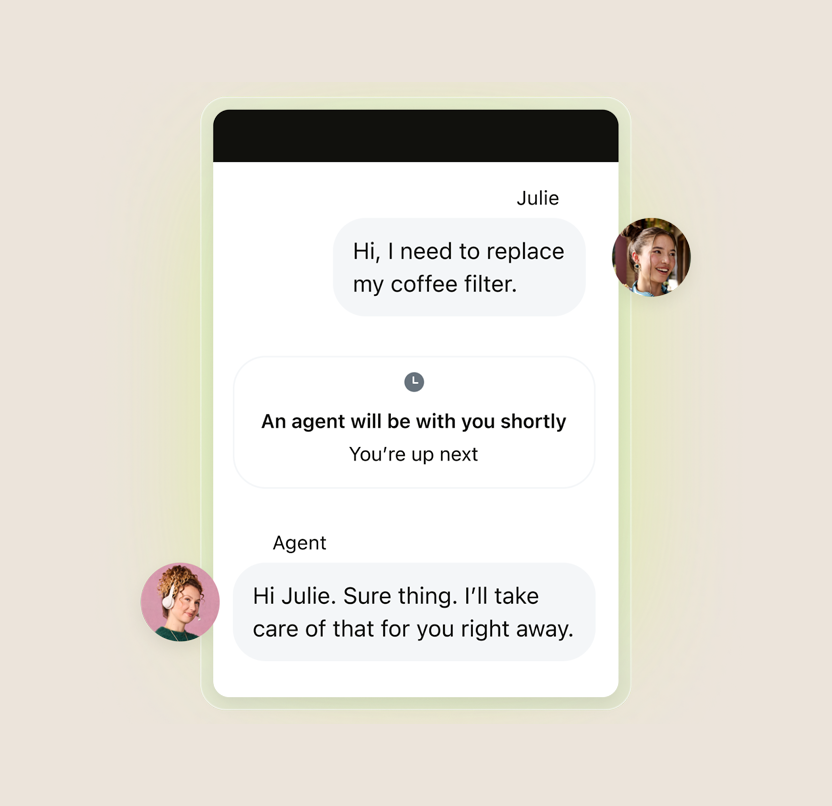Top 5 AI Agents Driving E-Commerce ROI in 2025
AI agents are becoming core infrastructure for e-commerce teams that want to scale without losing control. They handle support tickets, generate product content, forecast demand, and guide shoppers through purchase decisions with speed and consistency that manual workflows can’t match.
This post highlights the five best e-commerce AI agents that are actually delivering ROI for merchants in 2025. Each tool solves a specific problem, plugs into real workflows, and shows measurable business impact.
Best E-commerce AI Agents Comparison Table
What is an AI Agent?
Agentic AI is an advanced form of AI that can take actions, make decisions, and optimize operations autonomously. It represents the next evolution beyond traditional chatbots and automation tools.
Unlike traditional chatbots that follow scripted responses, AI agents can decompose complex problems, access real-time data, and execute tasks across multiple systems.
According to Gartner, agentic AI will autonomously make 15% of day-to-day work decisions by 2028, with specialized agents handling everything from demand forecasting to dynamic pricing.
How AI Agents are Driving E-commerce Growth
Driven by a forecasted 7% to 9% annual increase in online sales, e-commerce is anticipated to comprise 16.2% of total retail by 2025, as per Deloitte Insights. This surge reflects the ongoing acceleration of the digital shift.
Key to this transformation is the creation of personalized and frictionless interactions at all customer touchpoints. AI agents are ideally suited to meet this demand, effectively operating across the entire customer engagement spectrum.
The results speak for themselves: retailers using AI for personalization report a 2.3x increase in sales and a 2.5x profit boost, according to Nationwide Group research.
5 Best AI Agents for Increasing E-Commerce ROI
The five best e-commerce AI agents making a measurable difference are:
- Rep AI: Best for Converting Shoppers and Automating Conversations
- Impact Analytics: Best for Inventory Optimization
- Talkative: Best for Customer Engagement via Voice and Video
- Kore AI: Best for Complex Workflow Orchestration and Large-Scale Automation
- Hypotenuse AI: Best for High-Volume Product Content Creation
While AI agents are becoming more common across the industry, these solutions stand out for their ability to consistently demonstrate real business outcomes at scale.
1. Rep AI: Best for Converting Shoppers and Automating Conversations
Rep AI is a fully automated sales and support agent designed for Shopify and its ecosystem of direct-to-consumer e-commerce stores. The AI agent engages shoppers in real time through an on-site chat, answering product questions, handling objections, and guiding users toward purchase decisions without requiring human intervention.
The platform connects directly to product catalogs, customer data, and store policies to provide personalized responses. It can address common pre-purchase concerns like sizing, shipping, or promotions, and is built to retain context throughout a conversation.
Rep AI also includes analytics for tracking conversion impact, engagement rates, and the percentage of conversations resolved without escalation to human support.
Because it operates autonomously, Rep AI reduces the need for live agents while increasing sales opportunities around the clock. It's especially effective for brands dealing with high ticket volumes or product-related questions.
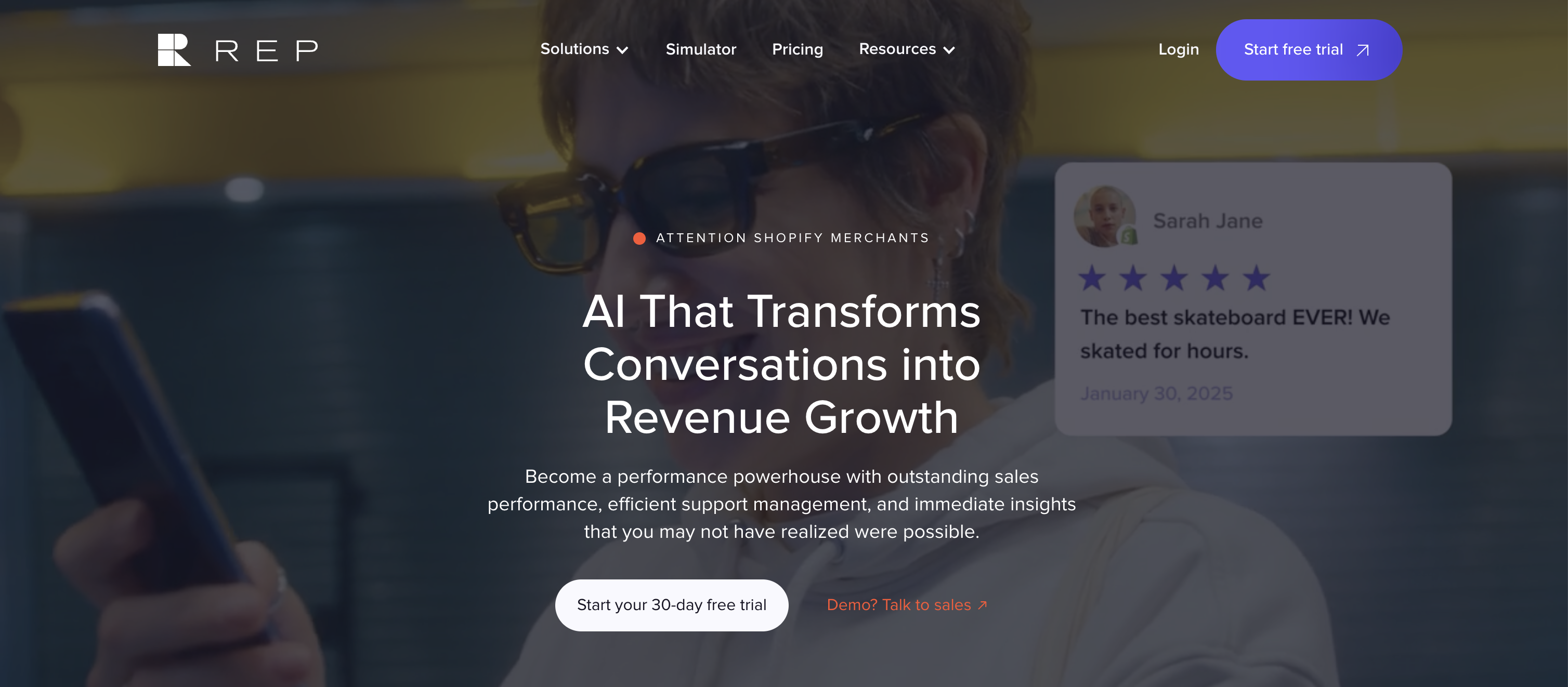
Example of ROI Impact
Snow, a direct-to-consumer brand, used Rep AI to re-engage hesitant shoppers and drive measurable results. By automating abandoned cart conversations, the company achieved a 33.85% conversion rate on those flows and added over $220,000 in recovered revenue. Nearly all customer interactions—98.34%—were handled without a live support agent.
Uprising Foods also saw strong gains. After deploying Rep AI to manage routine support around subscriptions, the brand increased its overall conversion rate from 3% to more than 5%. That lift contributed to a 21.5% net boost in company profitability, while also easing the load on internal teams by significantly reducing inbound support requests.
For a deeper look at how shoppers interact with on-site AI and the behaviors driving conversion, download Rep AI’s 2025 AI Shopper Behavior Report. The insights will help shape how you deploy AI across your store.
Key features
- Proactive sales engagement
- 24/7 support automation
- AI workflows for common support tasks
- Proactive abandoned cart recovery
- AI training for continuous improvement
- Robust shopper insights and analytics
- One-click Shopify installation
Pricing
Rep AI offers separate plans for Sales Agent, Support Agent, or a Concierge Bundle, combining both. You can start small and scale as you grow.
- AI Sales Assistant: Starts at $12 (Pay as you grow) up to $2,390/month
- AI Support Agent: Starts at $49/month up to $1,075/month
- AI Concierge (Bundle): Starts at $99/month up to $2,870/month
Pros
- Built specifically for Shopify and eCommerce workflows
- Easy, no-code setup
- AI training for continued optimization
- Handles both support and conversion use cases in one tool
2. Impact Analytics: Best for Inventory Optimization
Impact Analytics offers AI-powered forecasting and inventory solutions built for modern retail. Its tools help e-commerce and omnichannel businesses optimize stock levels and meet demand more accurately across every sales channel.
The platform’s AI agents use machine learning to analyze a wide range of variables, including historical sales, seasonality, local events, and macroeconomic factors. It then generates item-level predictions that guide assortment planning, replenishment, and inventory allocation.
A global luxury fashion brand used Impact Analytics' InventorySmart solution to overhaul its inventory management process. The brand was struggling with missed sales due to stockouts and excess inventory across locations. After implementation, the company achieved a 10% reduction in inventory costs and increased its SKU availability by 12%, resulting in stronger in-season sell-through rates.
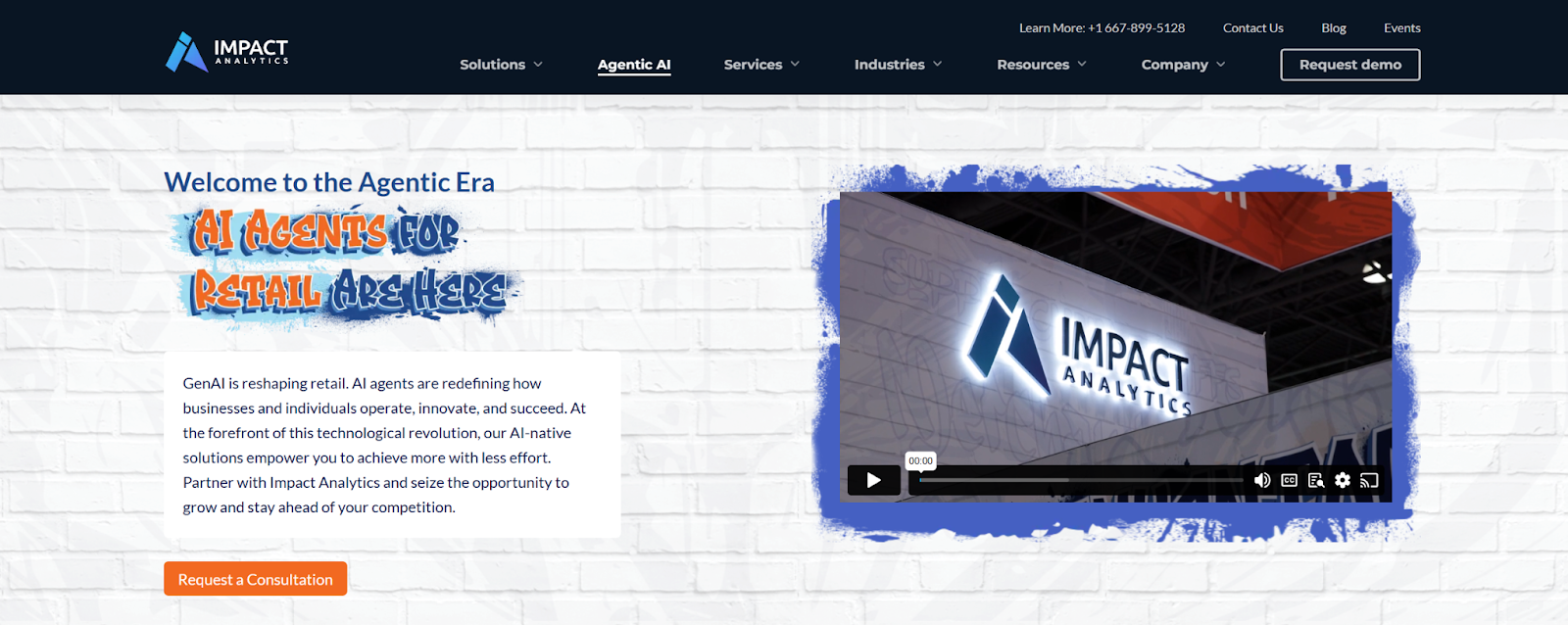
Key Features
- AI-driven demand forecasting
- Store and SKU-level replenishment recommendations
- Inventory optimization across channels
- Real-time integration with POS, ERP, and planning tools
- Automated assortment and allocation workflows
Pricing
- Contact for pricing
Pros
- Reduces inventory costs while maintaining availability
- Improves sell-through and planning accuracy
- Designed for complex, multi-location retail
3. Talkative: Best for Customer Engagement via Voice and Video
Talkative stands out for its real-time, personalized support capabilities, especially across voice and video. It combines traditional live chat with AI-enhanced features and an agent copilot, allowing brands to deliver high-touch experiences even online.
Their voice AI integration handles phone inquiries with human-like conversation quality, while their live chat AI assists human agents with instant access to knowledge base information and suggested next steps.
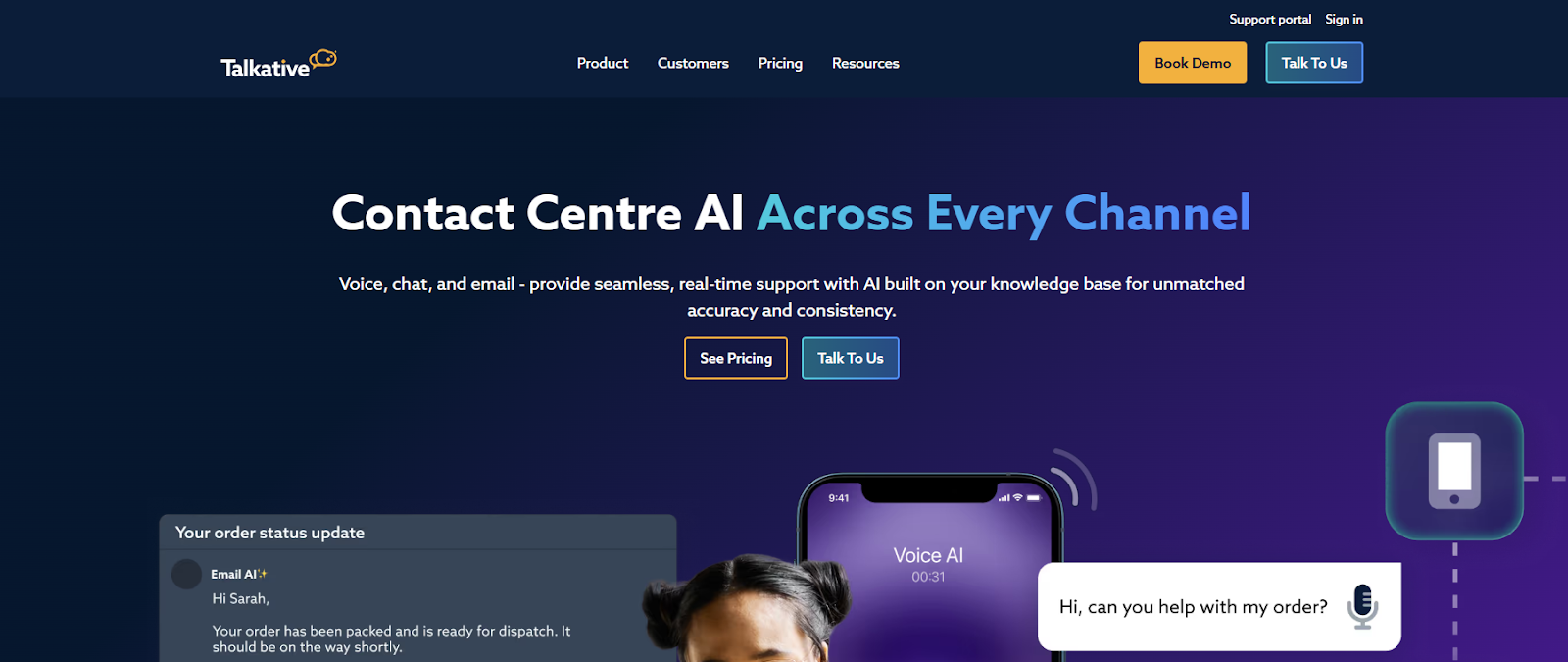
Key Features
- Voice AI to automate phone support with a human-like voice
- AI live chat that assists support agents
- AI agent training simulator
- Agent Copilot features
Pricing
- Starter: $70/month for up to 100 conversations
- Pro: $650/month for up to 1,000 conversations
- Advanced: $1,800/month for up to 3,000 conversations
- Enterprise: Contact for pricing
Pros
- AI agents for every channel
- Strong voice AI for phone support
4. Kore AI: Best for Complex Workflow Orchestration
Kore AI is a full-stack platform for building, managing, and orchestrating AI agents across service teams, sales departments, and operations. With Kore, brands can deploy multiple agents that work in concert to tackle multi-step workflows.
For example, a customer service agent might collaborate with an inventory agent to resolve a complex order issue without human intervention.
The platform also provides pre-built AI agents for common enterprise functions while offering no-code tools for creating custom agents for specific business needs.
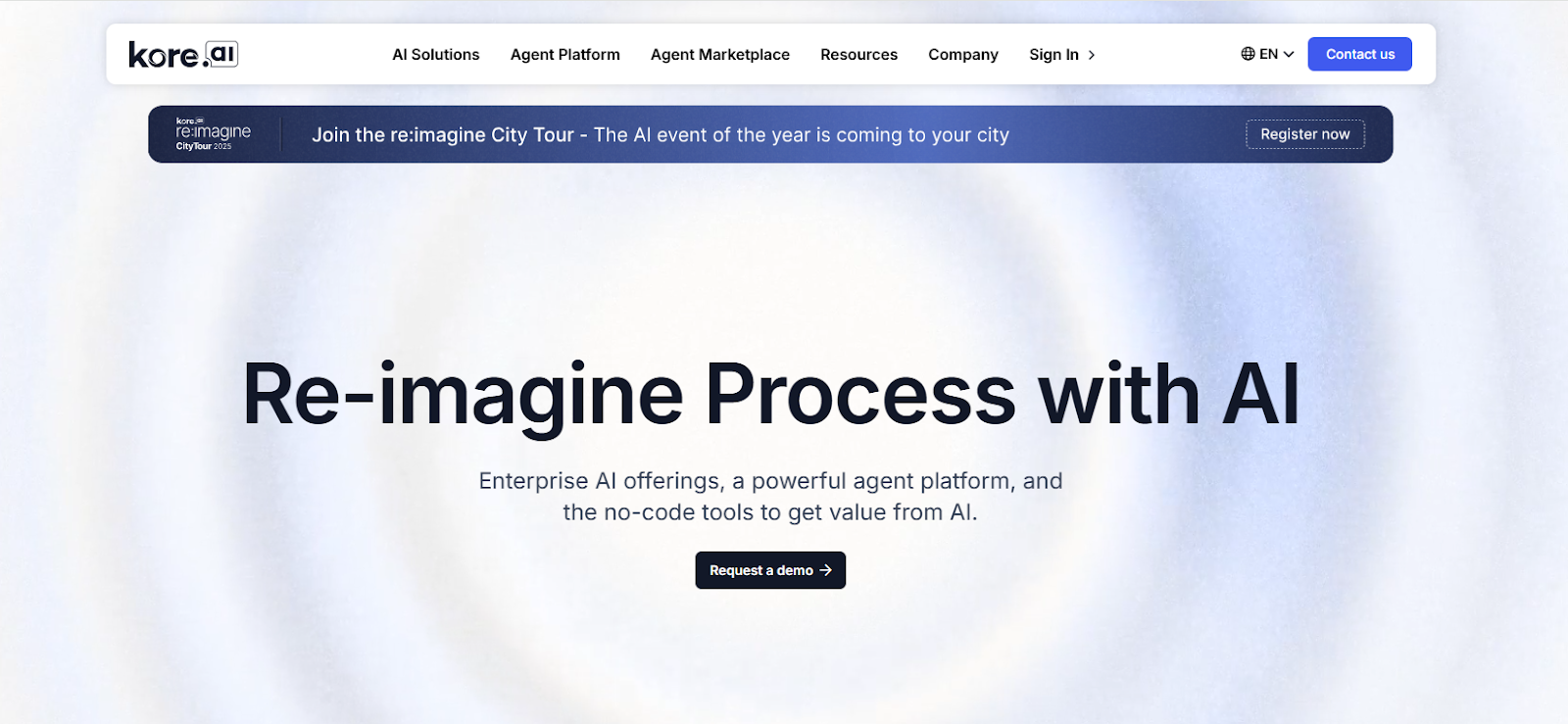
Key Features
- Multi-agent orchestration
- AI support for service reps
- Pre-built AI agents
- No-code tools to build custom AI agents
- Contextual agent collaboration
Pricing
- Contact for pricing
Pros
- Agents can work together through an orchestration layer
- Advanced functionality for complex use cases
5. Hypotenuse AI: Best for High-Volume Product Content Creation
Hypotenuse AI solves one of the most painful bottlenecks in e-commerce: generating high-quality product content fast. From titles and descriptions to SEO copy, this AI agent turns raw product data into ready-to-publish content in bulk.
ADA's LEGEAR Division used Hypotenuse to double its Return On Ad Spend (ROAS) from 9x to 17x while reducing time to market by over 95% for new product launches. Previously, preparing a single product took hours; now they can sync and generate content for entire catalogs with a single click.
Similarly, Volcom reduced its product content creation time from extensive manual processes to just 1-2 minutes per product review, saving approximately 140 hours each season while maintaining their high-quality standards.
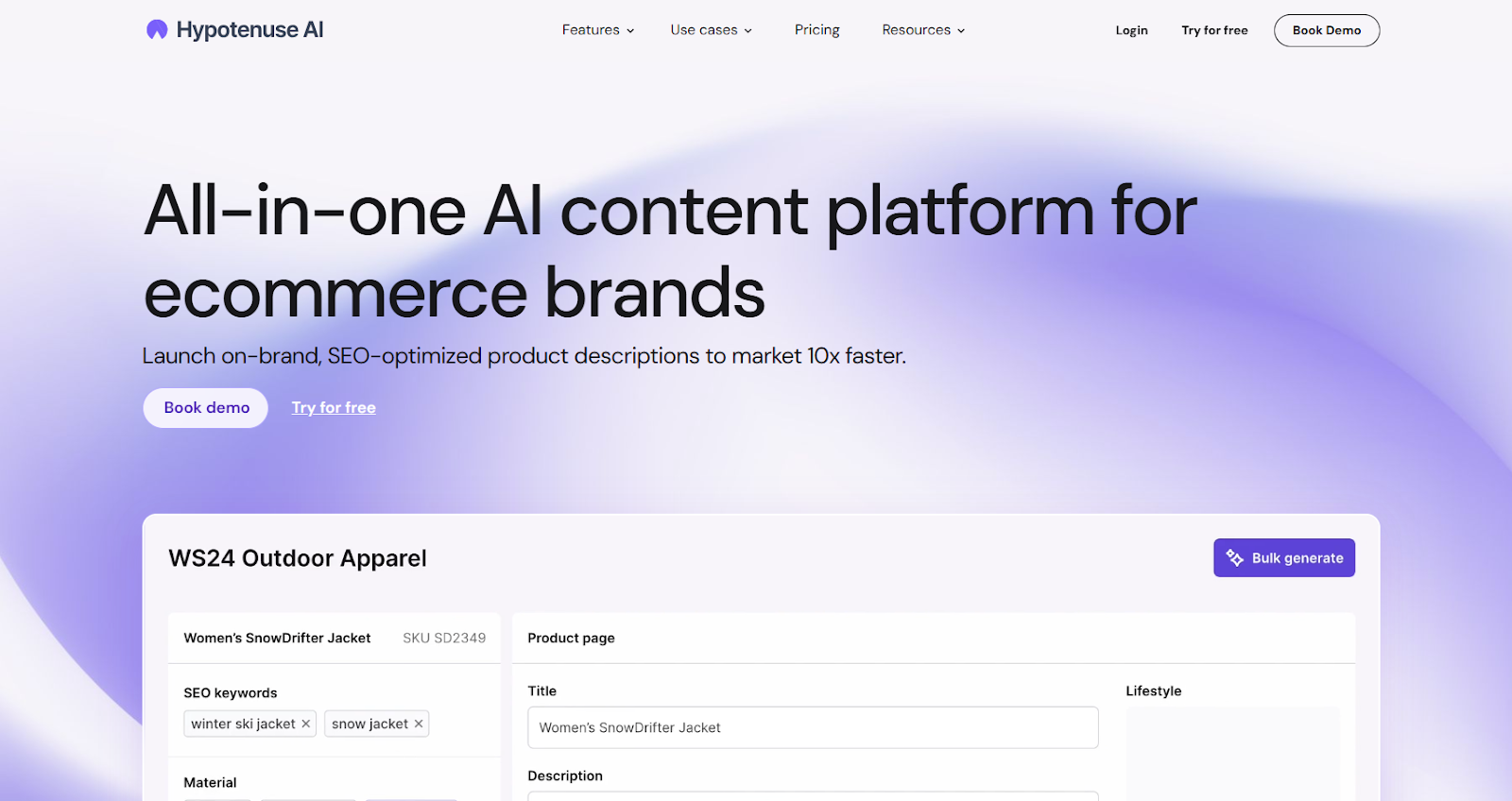
Key Features
- Product description generator
- Bulk content workflows
- Direct publishing to e-commerce channels
- AI batch editor for product images
- Auto enrichment of product data
Pricing
Hypotenuse AI offers the following plans for e-commerce
- Basic: $150/month (billed annually)
- Ecommerce Pro: Custom pricing
- Ecommerce Enterprise: Custom
Pros
- Significantly reduces the time needed to create product content
- Provides consistent, on-brand content
How to Choose an E-commerce AI Agent
Choosing the right AI agent starts with understanding how it fits into your specific business needs. Not all tools are built for the same use cases, and a strong match between capabilities and goals is what determines whether an agent successfully delivers ROI.
Here are four key AI agent attributes to evaluate when making a decision.
Role
Start with the problem you need to solve. Every AI agent should have a clearly defined role, whether it’s customer service, sales support, or backend automation. The agent’s role shapes its training, how it makes decisions, and how its performance is measured.
Data
AI agents rely on access to relevant, up-to-date data to make informed decisions. This may include customer history, product inventory, pricing information, and interaction patterns. The quality and completeness of this data directly impact the agent's effectiveness.
Look for tools that integrate directly with your e-commerce platform, CRM, and other operational systems without requiring manual syncs.
Actions
A key differentiator between AI agents and static automation is the ability to take action. This includes resolving tickets, sending emails, processing returns, or creating alerts. Agents that can complete these workflows end-to-end, without requiring handoffs, deliver higher efficiency and more consistent results.
Channel
Every AI agent is built to operate within one or more specific channels, such as websites, mobile apps, email, social media, or voice platforms. Channel alignment ensures that the agent can respond natively within those environments, maintaining speed, context, and consistency throughout the customer experience.
How Can You Use E-Commerce Agents?
As agentic AI matures, it is moving beyond narrow use cases to play a central role in running day-to-day operations.
Customer Support
AI agents can manage common inquiries such as order tracking, returns, and product questions around the clock. They reduce support volume while escalating complex issues to human agents as needed.
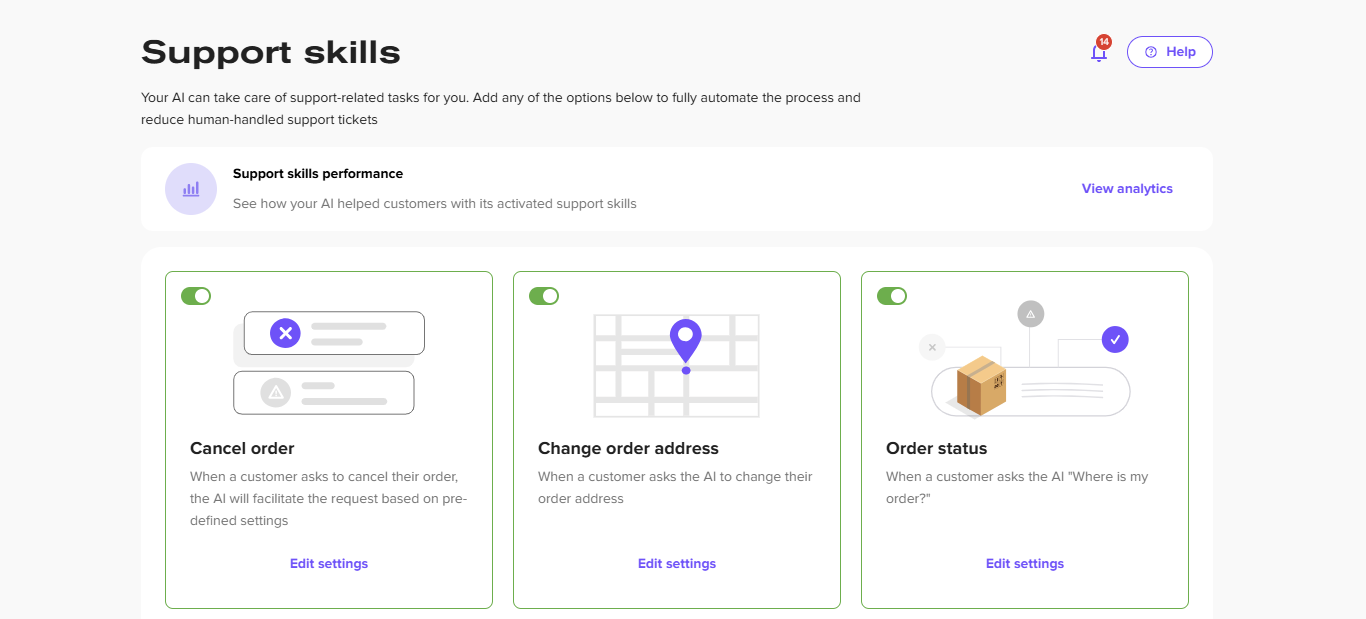
Shopping Assistance
AI agents can act as on-site sales advisors, helping customers discover the right product based on preferences or use cases. They ask clarifying questions, make recommendations, and guide the shopper to purchase. This happens intuitively without delaying or pressuring potential buyers.
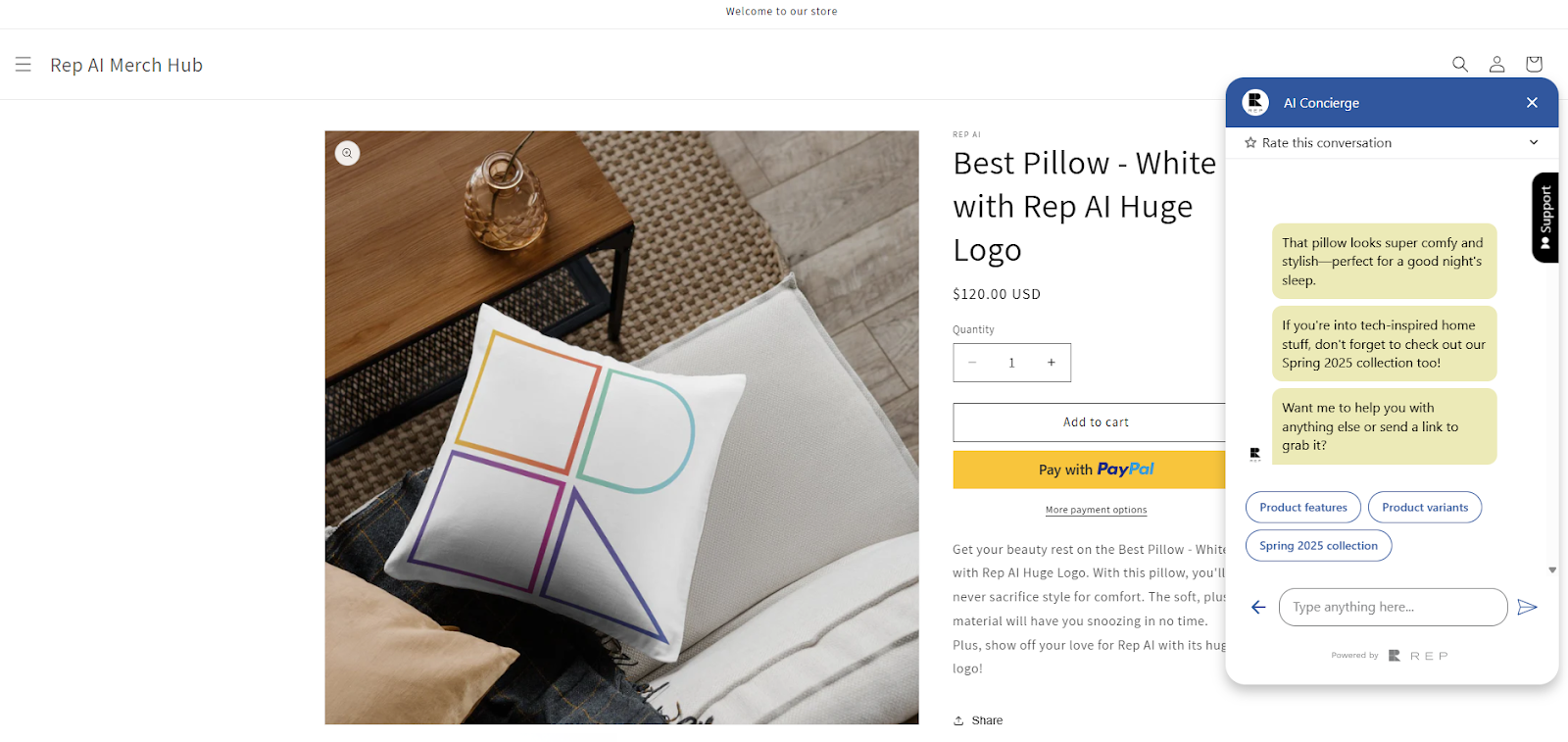
Process Automation
On the backend, AI agents streamline repetitive tasks like product categorization, data cleanup, and system syncing. Automating these jobs reduces manual error, speeds up workflows, and frees your team to focus on higher-value work.
Lead Generation
AI agents can capture leads and qualify prospects through real-time conversations. They can then trigger follow-up sequences personalized to user behavior. This improves the quality of inbound leads and moves them through the funnel faster.
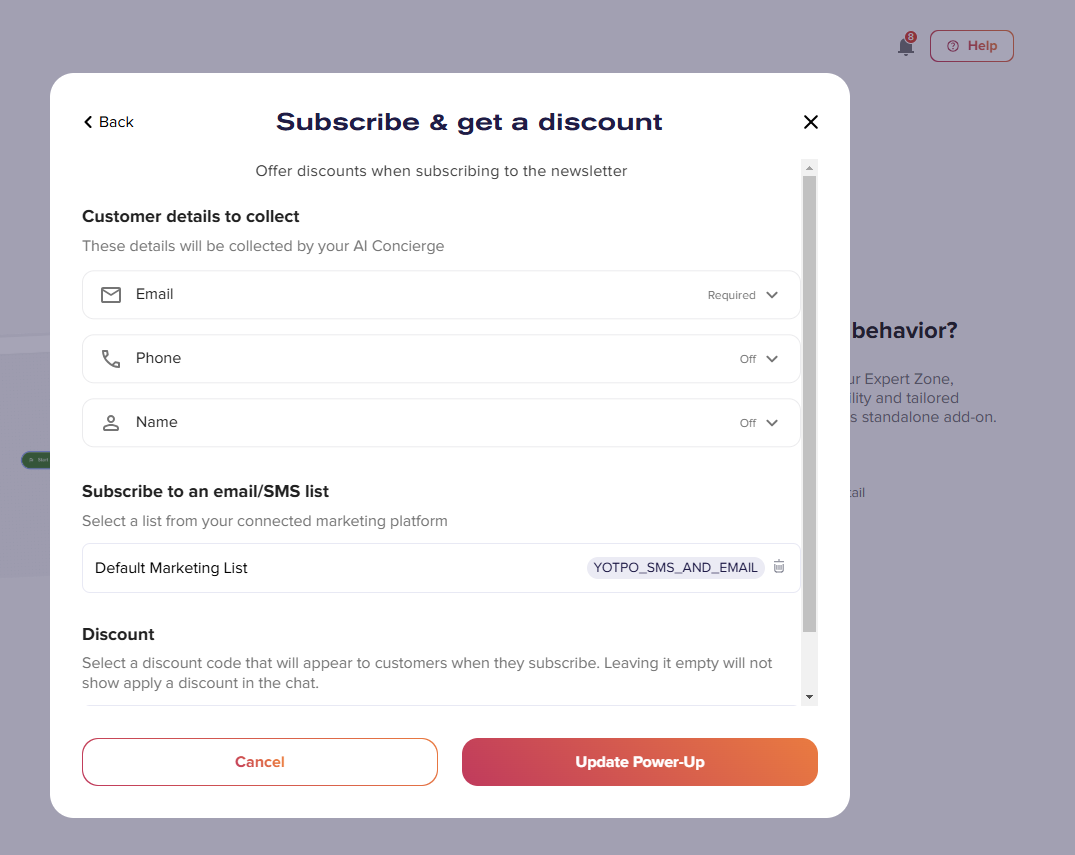
Systems Integration
Agents that connect multiple systems like your CRM, ERP, and e-commerce platform ensure customer and operational data stays synchronized. This integration supports smarter automation and creates a more cohesive view of customer interactions.
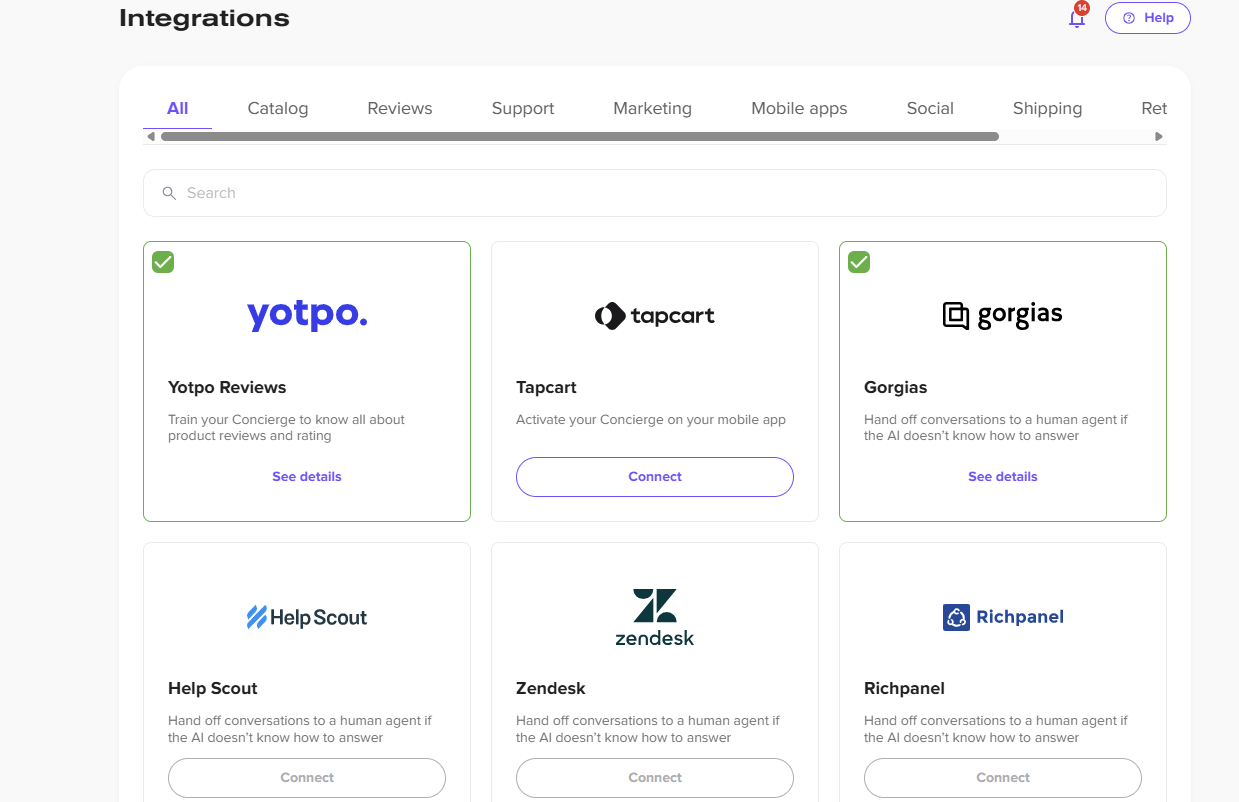
Automate Sales and Support with Rep AI’s E-Commerce Agent
E-commerce brands are under pressure to do more with less: fewer support resources, faster sales cycles, and tighter margins. AI agents offer a practical path forward by handling everything from shopper questions to cart recovery with speed and precision. The key to maximizing agent success is using agents built specifically for commerce.
Rep AI is designed for such. It engages visitors in the moment, answers product questions, and helps move shoppers toward purchase. It works around the clock and connects directly to your Shopify store, acting as both a sales assistant and support rep.
If you're looking to boost conversions and reduce support volume without adding headcount, try out a free trial of Rep AI today.
FAQs On eCommerce AI Agents
1. What is an AI agent in e-commerce and how does it work?
An AI agent in e-commerce is an autonomous system that performs tasks such as sales, customer support, inventory forecasting, and product content creation without human input. Unlike basic chatbots, AI agents can make decisions, access real-time data, and take action across multiple systems to improve ROI and efficiency.
2. Which AI agents deliver the highest ROI for online stores in 2025?
The top AI agents driving measurable ROI in 2025 include:
- Rep AI – for automated sales and support on Shopify
- Impact Analytics – for inventory forecasting
- Talkative – for voice and video customer engagement
- Kore AI – for multi-agent enterprise orchestration
- Hypotenuse AI – for scalable product content generation
Each specializes in a specific area of the e-commerce funnel and integrates into existing workflows.
3. How is Rep AI different from other sales chatbots?
Rep AI is a fully autonomous sales and support agent built specifically for Shopify merchants. It goes beyond rule-based chatbots by understanding context, personalizing responses, and recovering abandoned carts—all without human input. It also includes analytics for measuring impact on conversions and customer experience.
4. Can AI agents replace human support teams in e-commerce?
AI agents can handle the majority of routine customer inquiries, product questions, and pre-sale objections. While they reduce the need for large support teams, they typically escalate complex cases to human reps. Brands using agents like Rep AI often see over 95% of conversations resolved without human involvement.
5. How do AI agents improve product content creation?
Agents like Hypotenuse AI automate the creation of product titles, descriptions, and SEO copy. They turn raw data into publish-ready content at scale, reducing time-to-market by over 90%. These agents maintain consistent tone, brand language, and accuracy across large catalogs.
6. What’s the difference between AI automation and agentic AI?
AI automation handles predefined tasks. Agentic AI, by contrast, can plan, reason, and take actions across systems autonomously. In e-commerce, agentic AI can adapt to user intent, trigger workflows, and personalize experiences dynamically—boosting both sales and operational efficiency.
7. How do I choose the right AI agent for my e-commerce business?
Start by defining the key challenge—sales conversion, support load, content production, or supply chain forecasting. Then evaluate agents based on:
- Integration with your stack (e.g., Shopify, ERP, CRM)
- Ability to take autonomous action
- Data access and learning capabilities
- Channel compatibility (chat, voice, email, etc.)
Choose the agent that best aligns with your goals and workflows.
8. Are e-commerce AI agents affordable for small and mid-sized brands?
Yes. Tools like Rep AI offer pricing tiers starting as low as $12/month, with pay-as-you-grow models. Even smaller brands can benefit from AI agents without needing enterprise budgets. ROI often comes quickly through higher conversion rates and reduced support costs.

.png)


